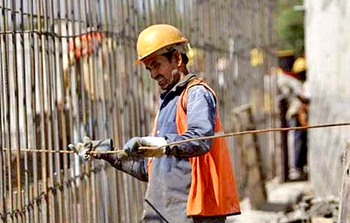New Delhi, May 30: India has overtaken China to become the world's fastest growing economy by clocking 7.5 percent GDP for the March quarter, prompting Finance Minister Arun Jaitley to say that the economy is clearly on "a recovery path".

The fourth quarter GDP data, Jaitley said, "gives us a broad idea of how the Indian economy is moving. It is absolutely clear that the economy is in a recovery mode".
The performance of manufacturing and services indicates that "we have a potential to grow at 8-9 percent and beyond", the Minister added.
While manufacturing sector output grew by 8.4 percent in the fourth quarter of last fiscal ended March 31, 2015, services sector including trade, hotels, transport and communications clocked a robust growth rate of 14.1 percent.
The fourth quarter GDP growth rate of 7.5 percent was better than China's 7.4 percent making India the fastest growing economy in the world.
Jaitley dismissed former Prime Minister Manmohan Singh's comments on the state of the Indian economy saying that an economy growing at fastest pace in the world cannot be 'fragile'.
"In a global slowdown situation, to have the fastest growth rate in the world certainly does not make Indian economy fragile," he said.
Industry chambers hailed the uptick in growth data but underlined the need for more initiatives on the ground level to improve investor sentiment and realise the true potential of the Indian economy.
Finance Secretary Rajiv Mehrishi said improvement in the manufacturing sector growth shows that jobs are being created.
Industry chambers, meanwhile, made a case for further rate cut by the Reserve Bank at its monetary policy on June 2 in view of declining inflation.
"Inflation, which was a major concern factor, has been on downward trajectory. We hope that Reserve Bank will cut the repo rate by 50 bps," said Ficci.
Industry body CII said the figure indicates that policy and reform initiatives taken by the government are bearing results on the ground.
"We expect further improvement of the key levers of the economy, going forward, as the government steps up public investment which in the process crowds in private investment to rekindle a new demand cycle in the economy," it said.
The CSO data has also revised the figures for three quarters of the last financial year. The GDP for the first quarter was revised to 6.7 percent, from 6.5 percent; for Q2 to 8.4 percent, from 8.2 and for Q3 to 6.6 percent from 7.5 percent.
It further said that Gross Value Added (GVA), a new concept introduced by CSO to measure economic activity, rose by 7.2 percent in 2014-15, compared to 6.6 percent in the previous fiscal.
The economic growth rate measured in terms of GVA for the January-March quarter improved to 6.1 percent as against 5.3 percent a year ago.
The manufacturing sector recorded a growth rate of 8.4 percent during the last quarter of the last fiscal, up from 4.4 percent a year ago. The services sector too witnessed marked improved during the quarter.
However, agriculture and mining and quarrying sectors remained laggards in the January-March quarter. The data showed that farm output during the quarter declined by 1.4 percent as compared to a growth of 4.4 percent in the corresponding quarter of the previous fiscal.
The output of mining and quarrying sector decelerated to 2.3 percent in the fourth quarter of the last fiscal as compared to a growth of 11.5 percent during the same period in 2013-14.
CSO further said that per capita income at current prices during 2014-15 rose by 9.2 percent to Rs 87,748 as against Rs 80,388 in the previous fiscal. It was Rs 64,316 in 2011-12 and Rs 71,593 in 2012-13.





Comments
Add new comment